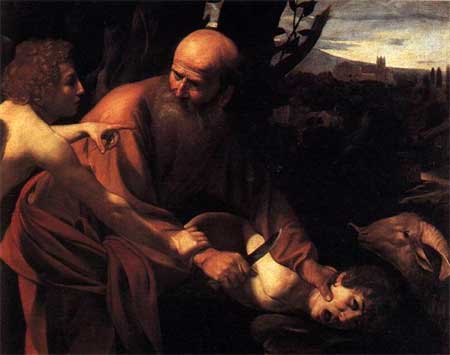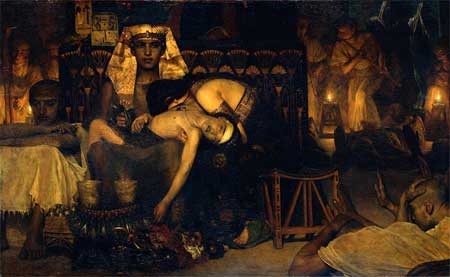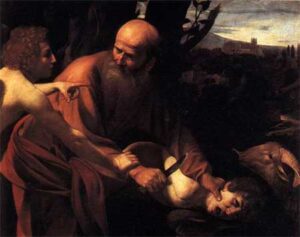Mastema in the Book of Jubilees
In the Book of Jubilees, Mastema seems to be identified with Satan. He asked the Lord that some of the spirits might be allowed to remain with him to do his will. God granted his request and allowed one tenth of the spirits to remain with Mastema, while the other nine parts would be condemned. He seems to be of a different nature than those evil spirits he is pleading for. He has no concern that he will be bound with the others.
“When Mastema, the leader of the spirits, came, he said: ‘Lord creator, leave some of them before me; let them listen to me and do everything that I tell them, because if none of them is left for me I shall not be able to exercise the authority of my will among mankind. For they are meant for (the purposes of) destroying and misleading before my punishment because the evil of mankind is great.’ Then he said that a tenth of them should be left before him, while he would make nine parts descend to the place of judgment.”
– Jubilees 10:8-9
The name Mastema is probable derived from the Hebrew, “Mastim”, the Hiphil participle of “Satam”, and it means ‘one who is adverse’ or ‘inimical.’ The word is equivalent to Satan (adversary). The term is sometimes used in the plural, which indicates that there was a class of ‘the Mastema’ as well as one prince, Mastema. This is similar to the chief Satan and his class of Satans (see 1 Enoch 40:7).
Jubilees implies that Mastema is subservient to God. His task is simply to tempt men to sin and if they do, he accuses them before the Throne of God. He does not initiate the process of sin, but Mastema and his spirits then lead them on to greater wrongdoing. This is related to the Biblical function of Satan, where men can achieve righteousness if they are tempted and resist.
“And they made for themselves molten images, and they worshipped each the idol, the molten image which they had made for themselves, and they began to make graven images and unclean simulacra, and malignant spirits assisted and seduced (them) into committing transgression and uncleanness. And the prince Mastema exerted himself to do all this, and he sent forth other spirits, those which were put under his hand, to do all manner of wrong and sin, and all manner of transgression, to corrupt and destroy and to shed blood upon the earth. For this reason he called the name of Seroh, Serug, for every one turned to do all manner of sin and transgression. – Jubilees 11:4-6
This portrayal of Mastema is not always consistent – sometimes he also is also presented as the incarnate of evil. He is seen as a destroyer and as one who hates Israel.

According to Jubilees, it was Mastema (not Sammael) who urged God to test the piety of Abraham (as Satan did with Job) by demanding Isaac as a sacrifice.
“Then Prince Mastema came and said before God: ‘Abraham does indeed love his son Isaac and finds him more pleasing than anyone else. Tell him to offer him as a sacrifice on an altar. Than you will see whether he performs this order and will know whether he is faithful in everything through which you test him.'”
– Jubilees 17:16
Mastema and Moses
Mastema is also attributed with certain actions that are ascribed to God, Himself. In Jubilees, it is Mastema who made an attack on Moses’ life, not God (Exodus 4:24). This is similar 1 Chronicles 21:1 and 2 Samuel 24:1 where Satan is attributed to asking David to take a census, as opposed to God.
“You know who spoke to you at Mt. Sinai and what the prince of Mastema wanted to do to you while you were returning to Egypt – on the way at the shady fir tree. Did he not wish with all his strength to kill you and to save the Egyptians from your power because he saw that you were sent to carry out punishment and revenge on the Egyptians?”
– Jubilees 48:2-3
Mastema is also attributed with opposing Moses in Egypt. He is said to have helped the Egyptian sorcerers achieve their wonders and urged the Egyptians to pursue after the children of Israel. Mastema was even bound and imprisoned so that he might not accuse them, re-released so that he might help the Egyptians, and finally bound again. (48:15-19)
“And the prince
Mastema stood up against thee, and sought to cast thee into the hands of Pharaoh, and he helped the Egyptian sorcerers, and they stood up and wrought before thee the evils indeed we permitted them to work, but the remedies we did not allow to be wrought by their hands.”
– Jubilees 48:9-10“And notwithstanding all (these) signs and wonders the prince
Mastema was not put to shame because he took courage and cried to the Egyptians to pursue after thee with all the powers of the Egyptians, with their chariots, and with their horses, and with all the hosts of the peoples of Egypt.” – Jubilees 48:12
Mastema and the Exodus

Also, Mastema is attributed with slaying the first-born in the land of Egypt, which is attributed to the Lord in Exodus 12:29.
“For on this night -the beginning of the festival and the beginning of the joy- ye were eating the passover in Egypt, when all the powers of Mastema had been let loose to slay all the first-born in the land of Egypt, from the first-born of Pharaoh to the first-born of the captive maid-servant in the mill, and to the cattle.”
– Jubilees 49:2
Mastema in the Fragments of a Zadokite Work
The Fragments briefly mention that if a penitent sinner vows to improve and then lives accordingly, the angel of Mastema departs from him.
Because of these similarities with the traditional role of Satan as portrayed in the Old Testament, it is probable that Mastema is just an apocalyptic name for Satan.











 Marchosias
Marchosias